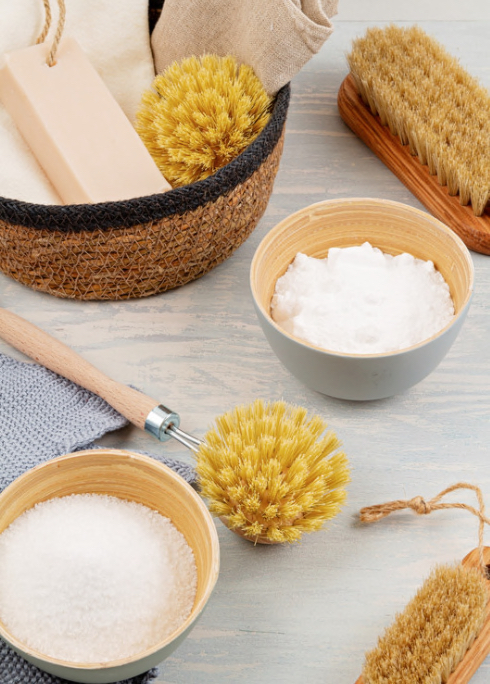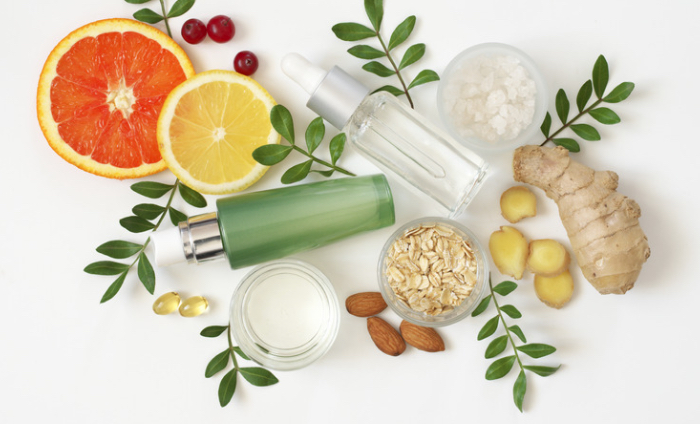The convenience of our modern lifestyle often comes with a heavy toll on our health. Our daily exposure to endocrine disruptors impacts our hormonal health. Organic food, filtered water, clean cosmetics can help you shop for happy hormones.
Audrey Lokiec, a London nutritional therapist specialised in naturopathy, guides us on how to minimize the bad effects of endocrine disruptors on our health.
What is an endocrine disruptor?
 Essentially, endocrine disruptors are chemical compounds -natural or man-made- that interfere with our endocrine (hormone) system by mimicking natural hormones in the body. Hormones act in very small amounts and at precise moments in time to regulate the body’s development, reproduction, metabolism, immunity and behavior.
Essentially, endocrine disruptors are chemical compounds -natural or man-made- that interfere with our endocrine (hormone) system by mimicking natural hormones in the body. Hormones act in very small amounts and at precise moments in time to regulate the body’s development, reproduction, metabolism, immunity and behavior.
Here’s the bad news: their toll on fetal development, the brain, the nervous and reproductive systems, is serious, often leading to various forms of cancer, neurological disorders or learning disabilities. Exposure to endocrine disruptors in the womb can even have consequences for the next generation.
What are the most common endocrine disruptors?
Bisphenol A (BPA): commonly found in polycarbonate plastics, as well as in the lining of canned food containers, baby feeding bottles, medical devices, water bottles. BPA is a chemical that has been used to harden plastics for more than 40 years.
 Phthalates: used to make plastic more flexible but also to keep smell and aromas last longer. We find them in many food and beverage containers and plastic wraps, kids toys, cosmetic products (perfumes, deodorants, shampoo, nail polish), home cleaning products, fresheners and scented candles.
Phthalates: used to make plastic more flexible but also to keep smell and aromas last longer. We find them in many food and beverage containers and plastic wraps, kids toys, cosmetic products (perfumes, deodorants, shampoo, nail polish), home cleaning products, fresheners and scented candles.
Flame-Retardant Chemicals or Polybrominated diphenyl ethers (PBDEs): considered as a persistent organic pollutant – used in mattress, foam cushioning, foam-based packaging materials, carpet padding, paint products, adhesives, synthetic clothes, electric equipment. PBDEs are very volatile and can be found in indoor dust; it is therefore very important to ventilate your house with fresh air at least 30 minutes per day.
How can we reduce our exposure to endocrine disruptors?
In our plate, in our glass, on our skin and in the air that we breath…these harmful synthetic or natural chemicals are ubiquitous in our everyday lives, and can significantly disrupt the delicate hormone dance. Reducing your exposure to them is key to maintain a healthy endocrine balance.
 But there are ways you can try to steer clear of EDCs. Here’s how.
But there are ways you can try to steer clear of EDCs. Here’s how.
1. Eat organic food
Choose organic fruits & vegetables: In organic agriculture, only less than 30 different types of pesticides (natural & non-toxic) are used compared to almost 500 different types in non-organic agriculture where some have been linked to hormone disruption.
 As a general rule of thumb, try to eat food that is as close to whole as possible- a whole roasted chicken instead of processed chicken nuggets, for example. When possible, avoid food packaging.
As a general rule of thumb, try to eat food that is as close to whole as possible- a whole roasted chicken instead of processed chicken nuggets, for example. When possible, avoid food packaging.
Reduce consumption of high-fat products such as milk and animal food as they contain toxins such as POPs (Persistent organic pollutants) which get stored in our fat tissues. Instead, select leaner cuts of meat and fish with the lowest toxic chemical content.
Drink filtered water: Drinking tap water out of a glass will reduce your exposure to chemicals contained in cans and plastic bottles. But tap water has gone through a long process of treatment and filtering: it can contain a bevy of its own potential hormone disruptors, including residue from pharmaceuticals products (such antidepressant, oral contraceptive pill, blood pressure medication).
Should we only drink water from plastic bottles? No they are not better and are challenging to the ecosystem!
The best way to have clear water is to have your own filtering water system (Carbon filters or have directly a water filtering system installed on your tap) in order to decrease the level of some endocrine-disrupting chemicals.
2. Clean smarter
While “cleaning,” we often introduce indoor air pollutants into our homes in the form of harsh chemical products. Replace all the toxic house cleaning products that contain lots of chemicals with natural and non-toxic cleaning products such as Ecover or Eco, and buy from companies that voluntarily disclose their ingredients. You can also easily make your own cleaners from safe household staples like vinegar and baking soda.
often introduce indoor air pollutants into our homes in the form of harsh chemical products. Replace all the toxic house cleaning products that contain lots of chemicals with natural and non-toxic cleaning products such as Ecover or Eco, and buy from companies that voluntarily disclose their ingredients. You can also easily make your own cleaners from safe household staples like vinegar and baking soda.
As lots of chemicals that act like endocrine disruptors are found in plastic, it is recommended to avoid plastic containers especially when you use them to store fatty foods. Never microwave them. Replace them with glass or stainless steel food storage containers.
Try to avoid cans as the inside lining contains phthalates.
3. Select non-toxic “Cosmetic Products”
Our skin performs several vital functions for our body. But do you know the real effects of what you’re putting on your body?
Our favorite everyday beauty products might be secretly packed with ingredients that are actually wreaking havoc with our hormones. Shampoo, lotions, sunscreens, make-up, hair dye, contain toxic chemicals responsible for eczema, hormonal disruption and reproductive problems.
 Try to avoid skincare products that contain harmful chemicals like Aluminum, DEA (diethanolamine), MEA (Monoethanolamine), TEA (triethanolamine), Parabens, Phtalates, Siloxanes (a suspected endocrine disruptors) and Triclosan.
Try to avoid skincare products that contain harmful chemicals like Aluminum, DEA (diethanolamine), MEA (Monoethanolamine), TEA (triethanolamine), Parabens, Phtalates, Siloxanes (a suspected endocrine disruptors) and Triclosan.
In general, the least amount of ingredients in the products you use, the better!
Short of living in a glass box, it can be hard to avoid EDCs completely. But there are ways in which you can cut down on the every day ingredients that might affect our hormones. Making small mindful changes every day will make a difference.
Reference
Hormone Disruptors In Beauty Products Might Be Behind Your Bad Skin (And Health)`: https://www.elle.com/uk/beauty/skin/a26957334/hormone-disruptors-skincare/
National Institute of Environmental Health Science: https://www.niehs.nih.gov/health/topics/agents/endocrine/index.cfm
